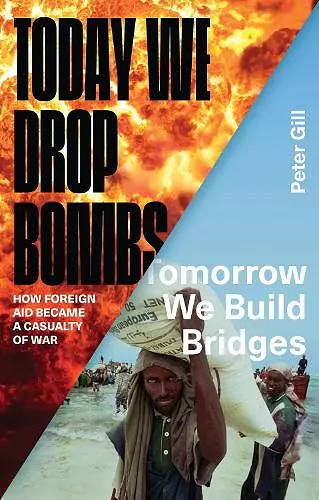Today We Drop Bombs, Tomorrow We Build Bridges
How Foreign Aid became a Casualty of War
Format:Hardback
Publisher:Bloomsbury Publishing PLC
Published:15th May '16
Currently unavailable, and unfortunately no date known when it will be back
This hardback is available in another edition too:
- Paperback£16.99(9781783601226)

Eye-opening and controversial, Peter Gill reveals first-hand the dilemmas of providing foreign aid at the sharp end.
'An indispensible inquiry into our moral health and humanity.'
LSE Review of Books
The war on terror has politicised foreign aid as never before. Aid workers are being killed at an alarming rate and civilians in war-torn countries abandoned to their fate.
From the ravaged streets of Mogadishu to the unending struggle in Helmand, Peter Gill travels to some of the most conflict-stricken places on earth to reveal the true relationship between the aid business and Western security. While some agencies have clung to their neutrality against ever stiffer odds, others have compromised their impartiality to secure the flow of official funds.
In a world where the advance of Islamic State constitutes the gravest affront to humanitarian practice and principle the aid community has faced in decades, Gill poses the crucial question – can Western nations fight in a country and aid it at the same time?
[A] brisk, hard-hitting narrative… Gill’s informed, on-the-ground reporting from Afghanistan, Pakistan, Somalia, and Syria demonstrates how Western aid agencies have, through their increasing reliance on government funding, surrendered their independence… Tales of corruption and compromise, of interest to anyone who’s ever contributed to a humanitarian aid organization. * Kirkus Reviews *
An indispensible inquiry into our moral health and humanity. * LSE Review of Books *
[Gill’s] analysis of what ensues when charities align themselves too closely with the aims of their governments, as in Afghanistan, is nuanced and piercing…His clear eye is a sure guide through some pretty fuzzy terrain. * New Internationalist *
This is a reasoned and authoritative account. * Peace Researcher *
[An] urgent and incisive book of reportage ... Gill’s deft analysis and reporting provide an enlightening account of a new world disorder, where the “civilized principles supposedly governing a war” have been forfeited. * Publishers Weekly *
Gill weaves his way from Syria to Afghanistan to Pakistan and Somalia, stopping in Geneva to recount the beginnings of the International Committee of the Red Cross and in Paris to learn about the origins of Médecins Sans Frontières (MSF), building up a complex and sometimes disturbing mosaic of experiences good and bad. * The Tablet *
This is a valuable book…and not only because it appears in the midst of the worst post-war humanitarian crisis in and around Syria. The issue of neutrality informs many of the big debates about aid. The book is full of misery, but full of admiration too for helpers such as the orthopaedic surgeon who leaves the Royal Bolton Hospital on a Friday evening to fly to Turkey, cross into Syria and carry out amputations for two days before returning to work on Monday. What are you going to do this weekend? * The Times *
Peter Gill shows with shocking clarity a lack of neutrality on the part of aid organizations. * Times Literary Supplement *
A superb book that shines a spotlight into critical but neglected issues. It promises to open up an essential and urgent debate on humanitarian values in today’s polarized politics. * Alex de Waal, author of Darfur, and co-author of Advocacy in Conflict *
Peter Gill visits the frontline in some of the most dangerous warzones in the world, and powerfully challenges the concept of benign aid. For anybody who believes in the need for a more peaceful world, this is an essential read. * Antony Loewenstein, author of Disaster Capitalism: Making A Killing Out Of Catastrophe *
Takes a hard look at the politicization of aid. * International Committee of the Red Cross *
With more and more aid money being diverted to serve national security interests, Gill challenges those NGOs that signed up as “force multipliers” for Western governments and got rich on the proceeds. An important book for all those who care about the future of our world. * John Hilary, executive director, War on Want *
A solid yet very readable analysis of the state of the humanitarian aid industry in the world’s current conflicts. And it holds a warning: for true humanitarianism to survive, its fundamental principles need to be reaffirmed. Urgently. * Linda Polman, author of War Games: The Story of Aid and War in Modern Times *
Gill challenges our assumptions about the neutrality of aid in conflict. His book is a must read for anyone concerned about the humanitarian aid business. * Richard Dowden, author of Africa: Altered States, Everyday Miracles *
I recommend this book highly as in introduction into the complexities of modern conflict and the growing repertoire to respond to the need of suffering human beings. * Tobias Denskus, Senior Lecturer & MA Program Coordinator Communication for Development, Malmö University *
In this brilliantly written account, Peter Gill bravely documents the tragic consequences of aid agencies and NGOs subordinating themselves to the war on terror. Gill's book eloquently persuades us all that it is past time for a re-affirmation of the values of neutral and politically independent development that respects the rights and wants of the poor as an end in themselves. * William Easterly, author of The Tyranny of Experts *
ISBN: 9781783601233
Dimensions: unknown
Weight: 558g
320 pages